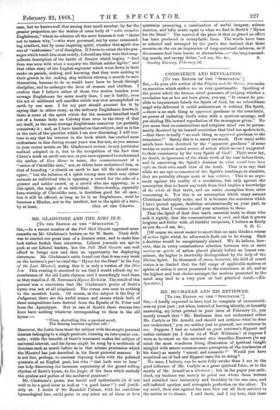CONSCIENCE AND REVELATION.
[TO THE EDITOR OF THE "SPECTATOR."] Sin,—In your able review of the Pilgrim and the Shrine, you make an assertion which strikes me as very questionable. Speaking of the power which the human mind possesses of judging whether a revelation has or has not been given, you say, " It cannot be pos- sible to impersonate falsely the Spirit of God, for no subordinate angel who delivered it could authenticate it without His Spirit, —there is no such thing as apparent goodness to the conscience, no power of imitating God's voice with a spurious message, and yet eluding His inward repudiation of the message so given." Do you mean that no conscientious and religious mind can be perma- nently deceived by its inward conviction that God has spoken to it, that there is really " no such thing as apparent goodness to the conscience ?" Surely this is to assert too much. How many noble minds have been deceived by the " apparent goodness" of some unwise or narrow moral course of action which seemed suggested to their consciences by the very Spirit of God ! Their error lay, no doubt, in ignorance of the whole truth of the case before them, and in narrowing the Spirit's decision to what would have been right on their own small view of the truth. That is to say, that while we are apt to conceive of the Spirit's teachings as absolute, they are probably always more or less relative. This is no argu- ment against the reality of a revelation, but only against the assumption that to know any truth from God implies a knowledge of the whole of that truth, and an entire exemption from error concerning it. Yet this is an assumption which many earnest Christians habitually make, and it is because the sentences which I have quoted appear, doubtless unintentionally on your part, to favour it, that I venture to call your attention to them.
That the Spirit of God does teach essential truth to those who seek it rightly, that the communication is real, and that it grows brighter and fuller with all faithful recipients, I believe as firmly [Of course we never meant to assert that no man thinks a course of action right which he afterwards finds out to be wrong. Such a doctrine would be conspicuously absurd. We do believe, how- ever, that in every conscientious selection between two or more motives or spirits of action placed plainly before an honest con- science, the higher is inevitably distinguished by the help of the Divine Spirit. In thousands of cases, however, the field of moral vision is so limited that the full range of applicable motives or spirits of action is never presented to the conscience at all, and so the highest and best choice amongst the motives presented to the mind may lead to a very poor or bad practical result.—En. Spectator.]


































 Previous page
Previous page